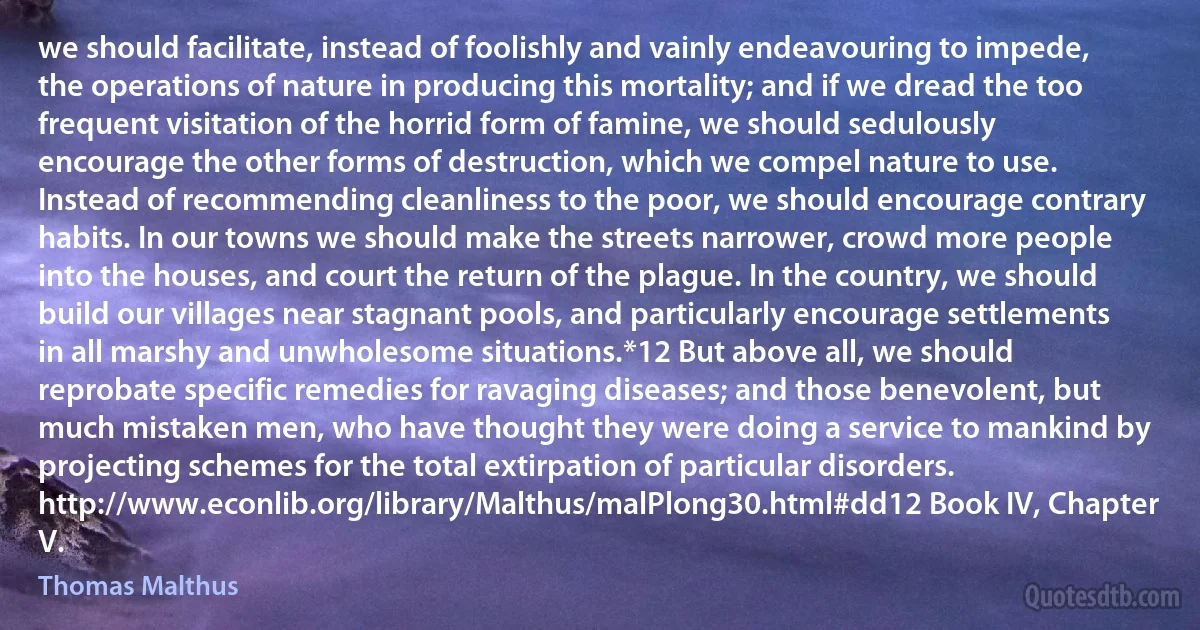
we should facilitate, instead of foolishly and vainly endeavouring to impede, the operations of nature in producing this mortality; and if we dread the too frequent visitation of the horrid form of famine, we should sedulously encourage the other forms of destruction, which we compel nature to use. Instead of recommending cleanliness to the poor, we should encourage contrary habits. In our towns we should make the streets narrower, crowd more people into the houses, and court the return of the plague. In the country, we should build our villages near stagnant pools, and particularly encourage settlements in all marshy and unwholesome situations.*12 But above all, we should reprobate specific remedies for ravaging diseases; and those benevolent, but much mistaken men, who have thought they were doing a service to mankind by projecting schemes for the total extirpation of particular disorders. http://www.econlib.org/library/Malthus/malPlong30.html#dd12 Book IV, Chapter V.
Thomas MalthusRelated topics
above book build country court crowd extirpation famine form men mistake mortality nature near people plague poor projecting ravaging reprobate return service should specific thought use visitation Malthus HTML endeavouring http org operationsRelated quotes
We will not be picking up axes and breaking into people's homes. But we will not remain silent either. Moderation in the face of evil is not what our age needs. As Ronald Reagan declared, "The future doesn't belong to the fainthearted." We must uncap our pens; we must speak words of truth. We are facing a determined enemy who is striving through all means to destroy the West and snuff out our traditions of free thought, free speech, and freedom of religion. Make no mistake: if we fail, we will be enslaved. We must not let the violent fanatics dictate what we draw, what we say, and what we read. We must rebel against their suffocating rules and thuggish demands at every turn. You can help the fight just by reading this book, which explains the many ways in which Islam has marked for death not just me, but all of Western civilization. We must, in the words of Revolutionary War veteran General John Stark, "Live free or die."

Geert Wilders
This mysterious something has been called God, the Absolute, Nature, Substance, Energy, Space, Ether, Mind, Being, the Void, the Infinite-names and ideas which shift in popularity and respectabilitywith the winds of intellectual fashion, of considering the universe intelligent or stupid, superhuman or subhuman, specific or vague. All of them might be dismissed as nonsense-noises if the notion of an underlying Ground of Being were no more than a product of intellectual speculation. But these names are often used to designate the content of a vivid and almost sensorily concrete experience-the "unitive" experience of the mystic, which, with secondary variations, is found in almost all cultures at all times. This experience is the transformed sense of self which I was discussing in the previous chapter, though in "naturalistic" terms, purified of all hocus-pocus about mind, soul, spirit, and other intellectually gaseous words.

Alan Watts
Today, after eighteen years of defeat, the book of your domination is again opened, and your first act awakens every unhappy memory, and threatens to destroy the confidence which your professions of patriotism inspired. You turned down a leaf of the history that recorded your last act of power in 1861, and you have now signalized your return to power by beginning a second chapter at the same page, not this time by a heroic act that declares war on the battlefield, but you say, if all the legislative powers of the government do not consent to let you tear certain laws out of the statute-book, you will not shoot our government to death as you tried to do in the first chapter, but you declare that if we do not consent against our will, if you cannot coerce an independent branch of this government, against its will, to allow you to tear from the statute-books some laws put there by "there by the will of the people, you will starve the government to death.

James A. Garfield
The impression that infra-human mammals more or less confine themselves to heterosexual activities is a distortion of the fact which appears to have originated in a man-made philosophy, rather than in specific observations of mammalian behavior. Biologists and psychologists who have accepted the doctrine that the only natural function of sex is reproduction, have simply ignored the existence of sexual activity which is not reproductive. They have assumed that heterosexual responses are a part of an animal's innate, "instinctive" equipment, and that all other types of sexual activity represent "perversions" of the "normal instincts". Such interpretations are, however, mystical. They do not originate in our knowledge of the physiology of sexual response (Chapter 15), and can be maintained only if one assumes that sexual function is in some fashion divorced from the physiologic processes which control other functions of the animal body.

Alfred Kinsey
It may be observed of mathematicians that they only meddle with such things as are certain, passing by those that are doubtful and unknown. They profess not to know all things, neither do they affect to speak of all things. What they know to be true, and can make good by invincible arguments, that they publish and insert among their theorems. Of other things they are silent and pass no judgment at all, choosing rather to acknowledge their ignorance, than affirm anything rashly. They affirm nothing among their arguments or assertions which is not most manifestly known and examined with utmost rigour, rejecting all probable conjectures and little witticisms. They submit nothing to authority, indulge no affection, detest subterfuges of words, and declare their sentiments, as in a court of justice, without passion, without apology; knowing that their reasons, as Seneca testifies of them, are not brought to persuade, but to compel.

Isaac Barrow
